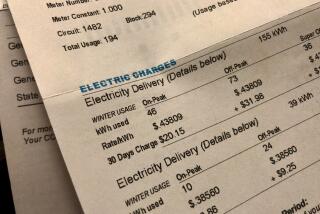PG&E loses exclusive control of its bankruptcy recovery plan

California power giant PG&E Corp. was stripped of its right to exclusively pitch a reorganization plan in court, escalating an already heated battle over the largest utility bankruptcy in U.S. history. The shares dropped more than 25% in after-hours trading.
U.S. Bankruptcy Judge Dennis Montali said he’ll allow bondholders including Pacific Investment Management Co. and Elliott Management Corp. to pitch their own restructuring plan alongside PG&E’s, so they can both come up with ways the utility could deal with an estimated $30 billion in wildfire liabilities. The damages, tied to blazes that its equipment ignited, forced the utility to file for Chapter 11 in January.
It’s the latest twist in a massive bankruptcy case that has already attracted some of the biggest names in the financial world. A group led by Pimco and Elliott has come up with a plan that would all but wipe out the stake of current shareholders in the utility.
Separately, PG&E’s Pacific Gas & Electric Co. shut off power to hundreds of thousands of homes and businesses Wednesday to avert wildfires in Northern and Central California.
Millions of Californians could spend days without power as the state’s largest utility continues shutting off electricity in a desperate attempt to avoid wildfires sparked by windblown power lines.
The creditors, including the fire victims, have “spoken loudly and clearly that they want their” proposal to be considered, Montali said in his ruling. While PG&E’s plan is “on track as well as can be expected,” he wrote, so is the competing version from creditors.
“One plan emerging as confirmable is a very acceptable outcome,” Montali wrote. “And if both plans pass muster, the voters will make their choice or leave the court with the task of picking one of them.”
The court denied requests by other parties to let them offer recovery plans too.
PG&E issued a statement expressing confidence that its reorganization plan “is the better solution for all constituencies and will be confirmed.”
“We are disappointed that the Bankruptcy Court has opened the door to consideration of a plan designed to unjustly enrich Elliott and the other ad hoc bondholders and seize control of PG&E at a substantial discount,” the company said.
Under bankruptcy law, a company has a limited amount of time to develop a reorganization plan and persuade creditors to vote in favor of it. Initially, no other competing proposals are allowed, so the bondholders needed permission from Montali before they could proceed. It’s unusual for a bankruptcy judge to grant such a request.
PG&E filed for bankruptcy on Jan. 29 to address liabilities resulting from a string of devastating fires that tore through Northern California in 2017 and 2018. The effects have been rippling through millions of ratepayers, hundreds of creditors, thousands of workers and the state’s political system.
The company has argued that ending its exclusive control before the company figures out its exact wildfire liabilities would “lead to further distraction, costs and waste” and would jeopardize the company’s chances of exiting bankruptcy by June, a deadline set by the state.
The San Francisco utility previously said it has lined up $34 billion in debt financing for a reorganization. The company has also received more than $14 billion in equity commitments. It has blasted the plan by Elliott and Pimco, saying it would lead to an “unjustified windfall” of billions of dollars for creditors at the expense of shareholders and utility customers.
Note holders, meanwhile, said their efforts wouldn’t delay the bankruptcy case. They’ve joined forces with wildfire victims to pitch a plan that would pay out $25.5 billion to victims and their insurers. Their campaign to end PG&E’s exclusive control was supported by the official committee of unsecured creditors, labor unions and fire victims.
Montali had ruled in August that PG&E should retain exclusive control over its restructuring and said last week that the group led by Pimco and Elliott would have to explain “what has changed in such a short period of time to justify reversing course.”
More to Read
Inside the business of entertainment
The Wide Shot brings you news, analysis and insights on everything from streaming wars to production — and what it all means for the future.
You may occasionally receive promotional content from the Los Angeles Times.











